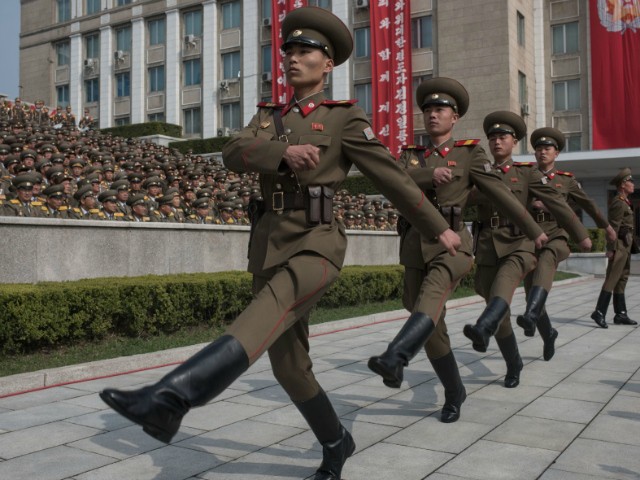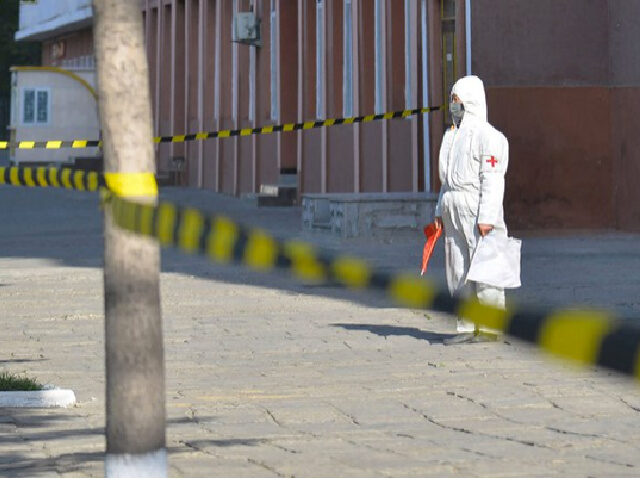Multiple news reports citing sources inside North Korea reported on Wednesday that the repressive communist government implemented a coronavirus lockdown in Pyongyang, the nation’s capital, beginning that day.
Some reports indicate the government banned residents from leaving their homes for at least five days.
Totalitarian dictator Kim Jong-un reportedly implemented the lockdown in response to a rise in Chinese coronavirus cases, a potential product of both seasonal conditions in the harsh North Korean winters and increased contact with neighboring China, currently experiencing, but largely denying, one of its deadliest outbreaks of Chinese coronavirus yet. Rumors of a potential lockdown reportedly prompted residents in the capital to begin panic-buying food and medicine earlier in the week even though the Kim regime had declared “shining victory” over the pandemic in August.
The lockdown follows Lunar New Year, a pan-Asian holiday, which, prior to the Chinese coronavirus pandemic, was considered the world’s largest travel day. The Chinese government in particular encouraged its citizens to travel this year, though plane ticket sales abroad indicated that many chose domestic over international trips this year.
Notably, reports citing satellite images suggest that the lockdowns have closed up necessary shops and public services but have not canceled practice for a major military parade expected to take place in February.
NK News, an outlet that specializes in information reports from the country, reported on Tuesday that its sources in Pyongyang had observed a spike in “panic-buying food in large quantities,” a result of rumors spreading that day of an impending lockdown.
“The source reported that Pyongyang citizens are buying large amounts of food at stores, as well as a notable buildup in traffic throughout the day,” NK News relayed.
Rumors appeared to surface from those with sources in the government as well as a marked change in the public atmosphere. NK News reported that its sources noticed the government deploying more staffers to check residents’ temperatures before letting them into stores and government buildings, as well as before allowing them through different sectors of the capital’s larger buildings.
The lockdown indeed appeared to take effect on Wednesday morning. Radio Free Asia (RFA), citing its sources in the country, reported on Wednesday that the government had posted lockdown notices for residents in the city, asserting that a rise in cases of “respiratory illness,” without naming the Chinese coronavirus, required the move.
“There have been confirmed cases of COVID-19 in Pyongyang,” an unidentified source in North Korea, but outside the capital, told RFA. “An acquaintance in Pyongyang told me that the reason that the Central Quarantine Command imposed a lockdown in Pyongyang was an emergency measure for an epidemic.”
Another source claimed that officials in the capital had “blocked the operation of public service facilities such as restaurants and public baths in downtown Pyongyang.”
South Korean newspaper JoongAng Ilbo reported the lockdown took effect on Wednesday and would last at least five days. It noted that public announcements regarding the lockdown only appeared to mention “several illnesses … including the common cold,” but not Chinese coronavirus, suggesting that North Korea would begin using lockdown measures to fight illnesses outside of the pandemic.
The English-language edition of Rodong Sinmun, the official state newspaper of the North Korean communist regime, did not mention lockdowns in its coverage on Wednesday and Thursday but did publish reports claiming the government would immediately implement heightened “anti-epidemic” measures. On Wednesday, Rodong Sinmun announced a campaign of “information and education work” regarding illnesses, which would begin in Kaesong City, close to the border with South Korea.
“The working people’s organizations in the city are directing efforts to the information and education work to ensure the perfect barrier of blockade,” the newspaper reported, “and enhance the activeness of the masses in conformity with the characteristics of the area along the demarcation line by further enhancing their role as an ideological education body.”
On Thursday, Rodong Sinmun reported a nationwide effort to create a “perfect” infectious disease response.
“All sectors and units are taking foresighted measures to increase the efficiency of anti-epidemic work while firmly maintaining the anti-epidemic atmosphere throughout society in order to cope with the daily-worsening world health crisis,” the newspaper reported. “They are directing primary efforts to consolidating the anti-epidemic barrier and intensifying the medical examination and disinfection to prevent the outbreak and spread of viral respiratory diseases including influenza.”
Rodong Sinmun did not mention the Chinese coronavirus in its report.
NK News reported on Wednesday that the lockdown does not appear to have impacted practices for an upcoming military parade on February 8, suggesting the lockdown would not be in effect by then. The outlet cited satellite images taken by the firm Planet Labs showing soldiers training on Wednesday on the outskirts of the capital.

Korean People’s Army (KPA) soldiers march to their positions prior to a military parade in Pyongyang several years ago (ED JONES/AFP/Getty Images).
North Korea claimed to have not documented a single case of Chinese coronavirus nationwide between late 2019, when the virus first began infecting people in Wuhan, China, and “late April” 2022, when it suddenly announced thousands of cases of the disease. By mid-May of that year, Pyongyang reported 1.2 million cases of coronavirus to global health authorities. Before then, it had identified only one “inconclusive” case in August 2020.
The country’s first admitted coronavirus outbreak followed a massive military parade in which Kim Jong-un debuted the Hwasongpho-17, the nation’s latest alleged intercontinental ballistic missile. The parade featured columns of thousands of soldiers marching in lockstep and waving flags for throngs of attendees, a clearly risky event for infectious disease.

COMMENTS
Please let us know if you're having issues with commenting.